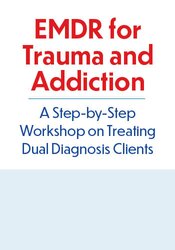

Imagine you’re sitting across from a client who has been battling addiction for years.
Something always pulls them back. The cravings, the urges, the compulsions – despite all their efforts, they can’t seem to break free.
What if you could help them heal the emotional pain and trauma driving their addiction? What if you could offer them lasting relief?
With EMDR you can … but they didn’t teach you this in basic training.
That’s why I created this step-by-step training, to give you the skills to use EMDR therapy to treat addiction and trauma simultaneously …
… so you can reach the traumatic roots of addiction, release the grip of cravings and urges, and offer your clients a powerful, lasting path to recovery.
I’m going to walk you through it all. The practical tools and specialized protocols that you can immediately apply.
No jargon, no confusion. Just clear and actionable instruction that will have you ready to:
I was amazed at how well these techniques led to lasting change for my clients. I think you will be too.
So don’t wait, purchase now!
Stacy Ruse
Planning Committee Disclosure - No relevant relationships
All members of the С�����Ƶ. planning committee have provided disclosures of financial relationships with ineligible organizations and any relevant non-financial relationships prior to planning content for this activity. None of the committee members had relevant financial relationships with ineligible companies or other potentially biasing relationships to disclose to learners. For speaker disclosures, please see the faculty biography.
Continuing education credit information is coming soon for this non-interactive self-study package.
CE hours may be available for select professions, as listed in the target audience. Hours will be dependent on the actual recording time. Please check with your state licensing board or organization for specific requirements.
There may be an additional fee for CE certificates. Please contact our Customer Service at 1-800-844-8260 for more details.
**Materials that are included in this course may include interventions and modalities that are beyond the authorized practice of your profession. As a licensed professional, you are responsible for reviewing the scope of practice, including activities that are defined in law as beyond the boundaries of practice in accordance with and in compliance with your professions standards.

Stacy Ruse, LPC, is an Evergreen EMDR consultant and clinician, IFS-Institute consultant, and founder of Aglow Counseling. She’s a trauma expert who specializes in using IFS Therapy, EMDR, and Somatic therapies to unravel the intricate threads of trauma and guide clients towards empowerment and resilience. She has been intensively trained in the Internal Family Systems model and, in addition to her clinical work, provides consultation for therapists looking to get the most out of their own work with IFS therapy. Her approach, while deeply rooted in trauma-informed methodologies, is characterized by a transpersonal twist that transcends the boundaries of traditional therapy. Stacy is certified in EMDR as well as a Nationally Certified Counselor (NCC) and Certified Yoga Instructor.
Speaker Disclosures:
Financial: Stacy Ruse is the owner of Aglow Counseling and has an employment relationship with Mindfully. She receives compensation as a consultant. She receives a speaking honorarium and recording royalties from Psychotherapy Networker and С�����Ƶ. Stacy Ruse is a paid consultant for Evergreen Certifications. She has no relevant financial relationships with ineligible organizations.
Non-financial: Stacy Ruse is a member of EMDRIA, the Colorado Association of Psychotherapists, and the Longmont Area Psychotherapy Network.
Access never expires for this product.
Visit our FAQ page at www.pesi.com/faq or contact us at www.pesi.com/info
How Trauma and Addiction are Intertwined:
Understand Addiction through EMDR’s AIP model
Case Conceptualization & Treatment Planning
Specialized EMDR Protocols for Addiction:
Reduce Urges, Decrease Cravings and Reduce the Risk of Relapse
EMDR Phases 2-8 in Addiction Treatment & Barriers to Treatment
Research, Risks and Other Considerations
Satisfaction Guarantee
Your satisfaction is our goal and our guarantee. Concerns should be addressed to: PO Box 1000, Eau Claire, WI 54702-1000 or call 1-800-844-8260.
ADA Needs
We would be happy to accommodate your ADA needs; please call our Customer Service Department for more information at 1-800-844-8260.
С�����Ƶ Mobile App
Access CE trainings on your phone or tablet through our free mobile app. Choose video or audio-only versions of online courses from the world’s best instructors, and complete your CE requirements anywhere, anytime, at your own pace.
Please wait ...